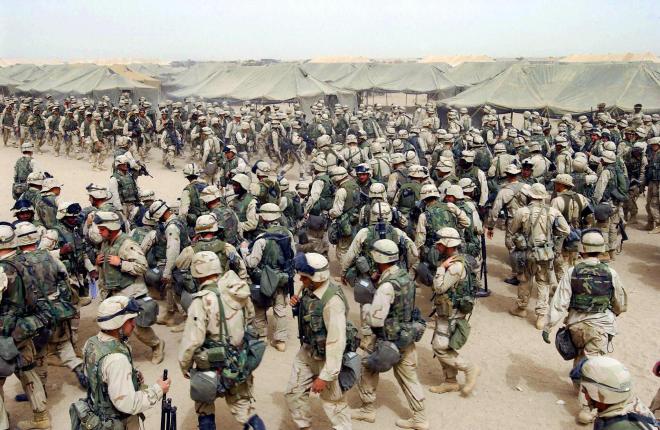Michael Ware, arguably the most intrepid of all the reporters in the country, emphatically argues: no.
There were Sunni interlocutors ready to cooperate with the US as early as the summer of 2003. Ware spoke to them. The rigidity of the ideology fomented by Bremer et al – the tribes no longer existed, the insurgency was a myth, all Iraqis were elated by liberation – blinded the US to the sectarian opportunities and pitfalls that lay in front of them. They were perhaps influenced by such writers as Bill Kristol and Lawrence Kaplan who wrote before the invasion the following encouraging sentences:
Predictions of ethnic turmoil in Iraq are even more questionable than they were in the case of Afghanistan… Unlike the Taliban, Saddam has little support among any ethnic group, Sunnis included, and the Iraqi opposition is itself a multi-ethnic force… [T]he executive director of the Iraq Foundation, Rend Rahim Francke, says, “we will not have a civil war in Iraq. This is contrary to Iraqi history, and Iraq has not had a history of communal conflict as there has been in the Balkans or in Afghanistan…”
Bill Kristol has suffered not a whit from this grotesque misjudgment (and never apologized), while thousands of young Americans lie dead because of it. But to ignore sectarianism in Iraq – to declare it a non-issue beforehand – remains the most serious misunderstanding of the whole enterprise – and thus made swift adjustment to reality harder. History can turn on moments like this one:
My friend [a Sunni former Baathist] said: ‘could you explain something for me?’
‘If I can, of course. You know that.’
‘Then tell me. I used US satellite imagery to kill Iranians in the eighties. Some of us did Ranger or Pathfinder training in the States. Al Qaeda? Never in this country. Right?’ he asked, rhetorically. ‘We had no great love for Saddam, and didn’t mind you taking him down. If you came for the oil, then take it; we have to sell it to someone. And, we’re happy if the occupier becomes a guest and we host US bases, akin to Germany and Japan.’
He paused.
‘So, how is it we end up on the opposite sides of this thing? I don’t get it. I just don’t get it.’
And there it was. Spoken. An insurgency.
The war’s ultimate goal, he told me, to much nodding approval around the room, was for the Sunnis to fight and negotiate their way to a seat at the table of power in the country. A seat they felt they’d been egregiously denied.
But in the weeks and then months I was being told such things, I could not find a single attentive ear within the US mission. Government authority then rested with the Coalition Provisional Authority of proconsul Paul L Bremer. Along with declaring so foolishly that the tribes of Iraq were effectively dead, CPA officials I encountered merely sniffed at the insurgents’ desire to converse. They would buckle under the heel of a new, soon-to-be democratic government. There was absolutely no palpable interest in encouraging a dialogue. Perhaps, even, quite the contrary.
Eventually, the rapprochement happened, and allowed us to leave with some face. But what if the “enemy” had been engaged as a potential ally in the summer of 2003? How many lives would have been saved? And what would we be saying now?
(Photo: US Marines from the 2nd battalion/8 MAR, prepare themselves after receiving orders to cross the Iraqi border at Camp Shoup, northern Kuwait, 20 March 2003. By Eric Feferberg/AFP/Getty Images.)
